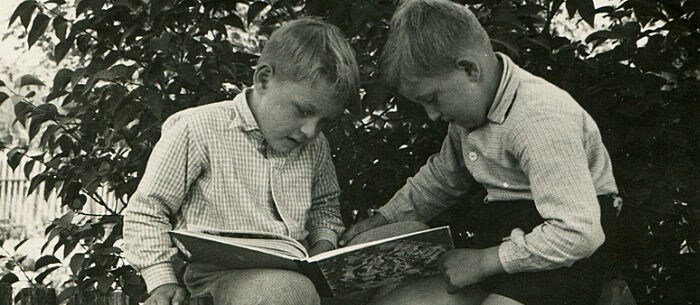Given enough time, almost everything that was once considered old-fashioned makes a comeback. Outdated clothing becomes “retro,” old furniture becomes “vintage” — even old-fashioned baby names get a second life as these classics grow in popularity.
It’s too easy to dismiss old-fashioned baby names as stodgy or out of touch, but there are benefits to these golden oldies. “Trendy names could fall out of fashion by the time your kids are adults,” points out Laura Emerson, the creator of Nameisms. “But old-fashioned names are easy to love. They have broad appeal and won’t ever make your child feel odd or excluded.”
Whether you choose an old-fashioned name or not, it’s vital to check every part of your child’s name. “Always check the initials of a name,” advises Michael Sherrod, the co-author of “Bad Baby Names.” “A child named Alan Scofield Smith will not want to monogram his shirt or towels.”
With that tip in mind, consider these 28 old-fashioned baby names:
Old-Fashioned Girl’s Names
- Gail (gayl)
Gail, a shortened version of the Hebrew name Abigail, means “father’s joy” and was popular in the 1950s.
- Maude (mawd)
An early Teutonic word meaning “mighty in battle,” Maude was popular in 1880.
- Rosemary (ROHZ-meh-ree)
In Latin, Rosemary means “bitter rose of the sea.” It was most popular during the 1930s.
- Mabel (MAY-bull)
Popular in the 1890s, this French name is short for Amabel and means “lovable.”
- Cora (KOH-ra)
This Greek name meaning “full heart” was most popular in 1880.
- Olive (AH-liv)
Popular throughout the 1800s, Olive is a variant of oliva, the Latin word for “olive tree.”
- Letitia (leh-TEE-shuh)
This Old English name was popular in the 1880s and means “joy.”
- Gladys (GLA-dis)
Popular in the 1920s, Gladys is a Welsh name that means “woman of the land” or “princess.”
- Frances (FRAN-sis)
Meaning “woman from France,” this French name was popular in 1910.
- Barbara (BAHR-ber-ah)
This 1940s Italian name means “foreign” or “strange.”
- Harriet (HA-ree-et)
This is the English form of the French name Henrietta means “ruler of the home.” It was popular in the 1880s.
- Minnie (MIN-ee)
This Teutonic name means “wished-for child” and was very popular from 1886 to 1900.
- Winifred (WI-ni-frehd)
Popular during the 1910s, this German name means “friend of peace.”
- Cecilia (suh-SEEL-yuh or suh-SEE-lee-uh)
Going all the way back to the third century, this Latin name means “blind.” It was popular in the early 1900s as well as today.
Old-Fashioned Boy’s Names
- Oscar (AHS-ker)
Irish for “champion warrior,” this name has been popular since the 1880s — long before the film award.
- Ernest (ER-nehst)
In addition to being the title character of several comedies in the 1990s, this German name signifies a “serious” spirit, and was popular in the 1920s.
- Chester (CHEHS-ter)
Popular in 1910, Chester is simply the word for “camp” or “fortress” in Old English.
- Jasper (JAS-per)
This English pronunciation of the Persian name Gaspar means “treasure” and was used by many parents in the 1880s.
- Bertram (BUR-trahm)
In Old German, this word means “bright raven.” It was popular in 1910.
- Homer (HOH-mer)
This name goes back to ancient Greece and means “security” or “pledge.” In the 1890s this was one of many classical names preferred by parents.
- Ronald (RAH-nuld)
This presidential name was given to many babies in the 1940s. It comes from Scotland and means “ruler with wise counsel.”
- Abraham (AY-bruh-ham)
This Hebrew name has been popular for thousands of years, but spiked in 1910. Fittingly, it means “father of many.”
- Eugene (YOO-jeen)
While this name may conjure up images of literature, it comes from France and means “well born.” It was very popular in the 1920s.
- Norman (NOHR-man)
This Teutonic name simply means “man from the North” and was very popular in the 1930s.
- Bruce (broos)
Although used by the Scottish and 1950s American parents, this name comes from France and means “woodlands boy.”
- Calvin (KAL-vin)
This name has been popular since the 1920s and means “bald” or “hairless” in Latin.
- Frederick (FREHD-rik)
This name, once popular in 1880, means “ruler of peace” in Old German.
- Theodore (THEE-uh-dohr)
In Latin, this name means “God’s gift” and was very popular around 1900.
Whether you choose to call them classic or old-fashioned, these well-loved names have stood the test of time.
Shellie Braeuner is an award-winning children’s author. She earned an M.Ed from Vanderbilt in human developmental counseling and has worked as a nanny for more than 25 years.




